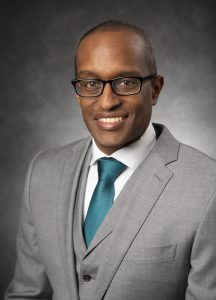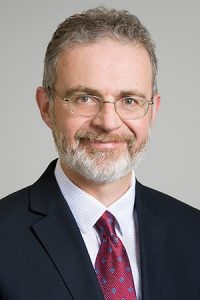Volunteer’s ‘Unique Perspective’ Makes Him Valuable for Several Committees
By Rodney Campbell, ABR Communications Manager
2024;17(5):11

There are more than 1,300 subject matter experts who serve as ABR volunteers. They write exam questions, serve on Angoff committees, give oral exams, and act as go-betweens with candidates and diplomates on Initial and Continuing Certification advisory committees.
Some, like Ezana Azene, MD, find their talents useful in multiple roles. Dr. Azene, an interventional radiologist at Gunderson Health System in Wisconsin, has written questions and been an oral examiner. His latest duty has him serving on the IR Continuing Certification Advisory Committee.
That committee’s chair, James B. Spies, MD, appreciates the knowledge and experience that Dr. Azene offers.“He brings a unique perspective informed by his long career in IR clinical practice to every committee discussion and, along with other committee members, brings practical suggestions and invaluable feedback,” said Dr. Spies, who’s also the ABR’s Associate Executive Director for Interventional Radiology. “Our IR CC Advisory Committee is essential to the ABR’s continuing efforts to improve its Continuing Certification processes and Dr. Azene has been a key contributor.”
Like all volunteers on the four ABR Continuing Certification committees, Dr. Azene is also a participant. Answering OLA questions to satisfy Part 3, for example, is part of his weekly routine.
“It’s very easy,” he said. “I get the email early Monday morning. I wake up, have my cup of coffee, and go through my email and open (myABR) to my two questions. It’s just part of my Monday.”
As is the case with most OLA participants, Dr. Azene needs to answer 52 questions per year to meet his annual progress requirement. But he doesn’t stop there. He responds to every question he receives, pushing his yearly total to 104.
Answering OLA questions affirms and sometimes delivers knowledge to participants. Dr. Azene is always ready to improve as a physician.
“I find it very useful and enjoy it almost like a continuing education experience,” he said.
After having to take a couple of years off from oral examining duties because of work commitments, Dr. Azene plans to get back to it next year. He enjoys sitting in the examiner’s seat and watching candidates succeed.
“I like interacting with examinees,” he said. “It’s rewarding to see them think through the questions and even sometimes struggle at first and then see that light go off in their eyes and the excitement that they get when they figure it out and get the correct answer. It’s really rewarding.”
Dr. Azene greets all his examinees the same way: He doesn’t want them to look at him as an authority figure. His goal is to determine their knowledge about the subject matter, not look for faults and reasons to fail the candidates. He would rather the exam be a conversation that reveals the candidate’s expertise.
“I want them to think about us as two colleagues in the IR department reviewing cases either before the start of the day or at the end of the day,” he said. “I tell them my goal is not to trick them or get them to answer questions incorrectly. I want the environment to be calm and welcoming so we can just have a discussion.”
His engaging personality meshes well with his ABR colleagues. Whether he’s doing committee work or serving as an examiner, Dr. Azene brings the same positive energy to the job. That’s among the reasons he’s in high demand as a volunteer.
“I’m a very outgoing person,” he said. “I like to be around people, talk to people, have conversations. That’s something I seek out.”
Call for Nominations for ABR Board of Trustees
By Matthew B. Podgorsak, PhD, ABR Board of Trustees Chair
2023;17(5):5

According to the ABR Bylaws, the Board of Trustees is a “multidisciplinary body that advances the quality, relevance and effectiveness of the ABR’s assessments for certification.” Trustees are distributed among the four disciplines certified by the ABR: diagnostic radiology, interventional radiology/diagnostic radiology, medical physics, and radiation oncology.
We are currently seeking nominations for Trustee positions in diagnostic medical physics, radiation oncology, interventional radiology/diagnostic radiology, pediatric radiology, neuroradiology, and cardiothoracic imaging. The term for new Trustees will begin in October 2025. The initial term is three years, and Trustees may be reappointed to serve for up to eight total years.
Nominees are expected to be professionally active and well-respected among their peers. A nominee must be 10 years or more post-certification and have been an active ABR volunteer within the last five years. Participation in ABR’s Continuing Certification (formerly Maintenance of Certification, MOC) program is required. Those not currently enrolled in Continuing Certification are required to enroll before beginning service.
Experience in education and training is desirable but not required. Nominees must be serious and independent thinkers. The ABR recognizes the value of diverse perspectives that might be offered by individuals of different races, ethnicities, and genders. The ABR will consider nominees from all types of employment environments, including private practice, community hospitals, and academic practices.
The time commitment necessary to fulfill the responsibilities of the Trustee role is significant, as are the rewards associated with the appointment.
For more information, please contact the ABR at information@theabr.org. Interested candidates may submit a curriculum vitae along with a letter of interest of less than two pages to cmoreno@theabr.org by November 15, 2024.
Drawing on Her Days as a Candidate Makes Her a Better Examiner
By Rodney Campbell, ABR Communications Manager
2024;17(5):12

As an ABR radiation oncology oral examiner, Malika Siker, MD, puts herself in the place of the candidate.
She knows that an examiner’s goal is to gauge knowledge and ensure that examinees can independently treat patients safely. But she and her colleagues also understand the nerves that examinees bring to the event because they’ve been there.
“It’s been reassuring to see that all the volunteers make the best effort to make sure that the examinee is comfortable and is given an opportunity to demonstrate their knowledge,” she said. “It’s a stressful process. I remember from when I went through it.”
Her experience as a candidate led her to serve as an examiner. She uses the best of what she saw during her time being examined and combined it with what she’s learned from the being on the other side of the table.
“It’s important to ensure that the examinee is best set up for success in terms of their mindset while in the exam,” Dr. Siker said. “However, as an examiner, I have a huge responsibility to verify that individuals who are going through the examination meet a threshold of competency. I take that responsibility very seriously.”
Dr. Siker picks up lessons as an examiner and computer-based exam question writer. She said she benefits from collaborating with experts from across her field and believes the cooperation has made her a better physician.
“It’s great to have a network of people that I can turn to when I am faced with a patient with a challenging clinical scenario,” she said. “I’ve reached out to many of the individuals I’ve met through the ABR to ask for their opinions.”
Dr. Siker writes questions for the RO Qualifying Hematological Malignancies and Benign Diseases Committee. Bouthaina Shbib Dabaja, MD, the chair of that committee, said Dr. Siker brings valuable skills to the group.
“She is thoughtful and knowledgeable,” Dr. Dabaja said. “She consistently brings a balanced view to the committee.”
In her role at the Medical College of Wisconsin, she sees patients clinically. Her specialties are the central nervous system and hematologic malignancies.
She also works with residents, providing them with opportunities to benefit from her everyday experiences.
“Because of my role within the health science university, I’m able to bring a lot of medical students to our department for clinical exposure and research,” she said.
Dr. Siker also finds that she learns from her residents while she’s instructing them. She keeps their thoughts in mind when she’s performing her ABR volunteer duties.
“I have the opportunity to teach in my daily practice as well as during clinical didactics,” she said. “They’re constantly challenging me. The questions that they ask allow me to understand what is relevant to the residents who are going through the process nationally.”
Dr. Siker has been associate dean for student inclusion and diversity at her institution for the past five years. As is the case with ABR volunteer committees, it’s important for the Medical College of Wisconsin to have diverse backgrounds and perspectives in its ranks.
“Everybody wants to recruit and retain the best possible individuals and to provide an environment that allows them to flourish and thrive,” Dr. Siker said. “Historically, certain groups of individuals have not had the same opportunity to become physicians or health science workers, so we want to be intentional about offering support and opportunities for individuals who may not have easy access to those resources.”
That work doesn’t end once hires are made. Retaining good physicians by making them feel welcomed and appreciated is vital. Dr. Siker said the college has made that a priority.
“We want to ensure that once individuals from underrepresented backgrounds join our teams, we cultivate a culture that allows everybody to be successful,” she said.


